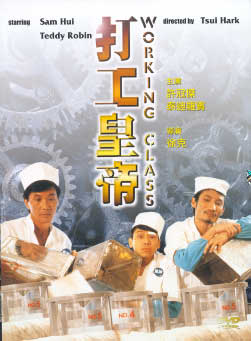Working Class

Director: Tsui Hark
Year: 1985
Rating: 7.5
Tsui Hark was almost
living a cinematic double life when he directed this film in 1985. After
releasing a few non-commercial films (Don’t Play with Fire and We are Going
to Eat You) that did quite badly at the box office, he hired himself out
to Cinema City. Cinema City was primarily known for its pratfall/stunt type
of comedies such as the Aces Go Places series. From 1981 to 1985 Tsui
directed a few of these comedies – Aces Go Places III, All the Wrong Clues,
All the Wrong Spies and this film – to good effect. They followed the City
Cinema formula and were quite successful at the box office.

These were not the type of films though that Tsui wanted to be doing. So
at the same time he was doing these he also made the classic Zu Warriors,
the evocative Shanghai Blues and was preparing for perhaps his greatest film
(and possibly the best HK film) Peking Opera Blues in 1986.

Working Class, which is the most obscure of his Cinema City work, deserves
much better. It is actually quite funny at times, has enjoyable chemistry
between the actors and has some interesting visual touches. It is a broad
humorous look at the conflict between the working class and management and
there are moments that reminded me of Chaplin’s Modern Times. There is a
lot of spirit in the film and it is all very black and white with the workers
being on the side of right and management being your basic scum! This sort
of heavy handedness doesn’t matter in a film like this though – its all for
good laughs.

Sam Hui is constantly getting fired from jobs – often for no reason of his
own. So too are Tsui Hark and Teddy Robins – though in their case it usually
is their fault. They meet in a soccer match (watch Hui perform some great
kicks) and initially become enemies of each other until they end up working
at the same noodle factory where they bond over their dislike of management
(Ng Man-Tat). Ng Man-Tat does everything he can to get them fired, but it
always backfires on him.

At the same time Hui has fallen in love with Joey Wong – but she is hiding
the fact from him that she is from a very wealthy family because he told
her that he would never marry a rich girl. In fact it turns out that her
father is the Chairman of the noodle factory – one of many coincidences –
such as Sam finding out that the Chairman is out of town and he takes Joey
to the Chairman’s home (with hot and cold running servants) for dinner pretending
that it is his!
Hui is such a personable actor that its
impossible not to enjoy watching him – and amazingly talented as well. In
the 70’s and 80’s he was one of the most popular singers in HK, had a famous
comedy act with his brother Michael and on top of that he is a terrific athlete
– as shown in a kick boxing match in this film. This is one of Joey Wong’s
very earliest roles and she just looks so good. Tsui was to employ her again
two years later in the classic Chinese Ghost Story.

The oddest actor to watch though is Tsui Hark himself. One would never guess
from seeing his acting performances that he was this brilliant innovative
director. Tall, skinny, gangly and slightly goofy looking with that goatee
he seems as far away from genius as one can get. In everything I have seen
him in – Yes Madam, I Love Maria, All the Wrong Spies his acting is so broad
and farcical that its hard to believe that he would be able to get such great
performances out of other actors.

This is an enjoyable film – less madcap by far than many of the Cinema City
films – somewhat touching at times – and it of course has a few Sam Hui tunes
thrown in.







